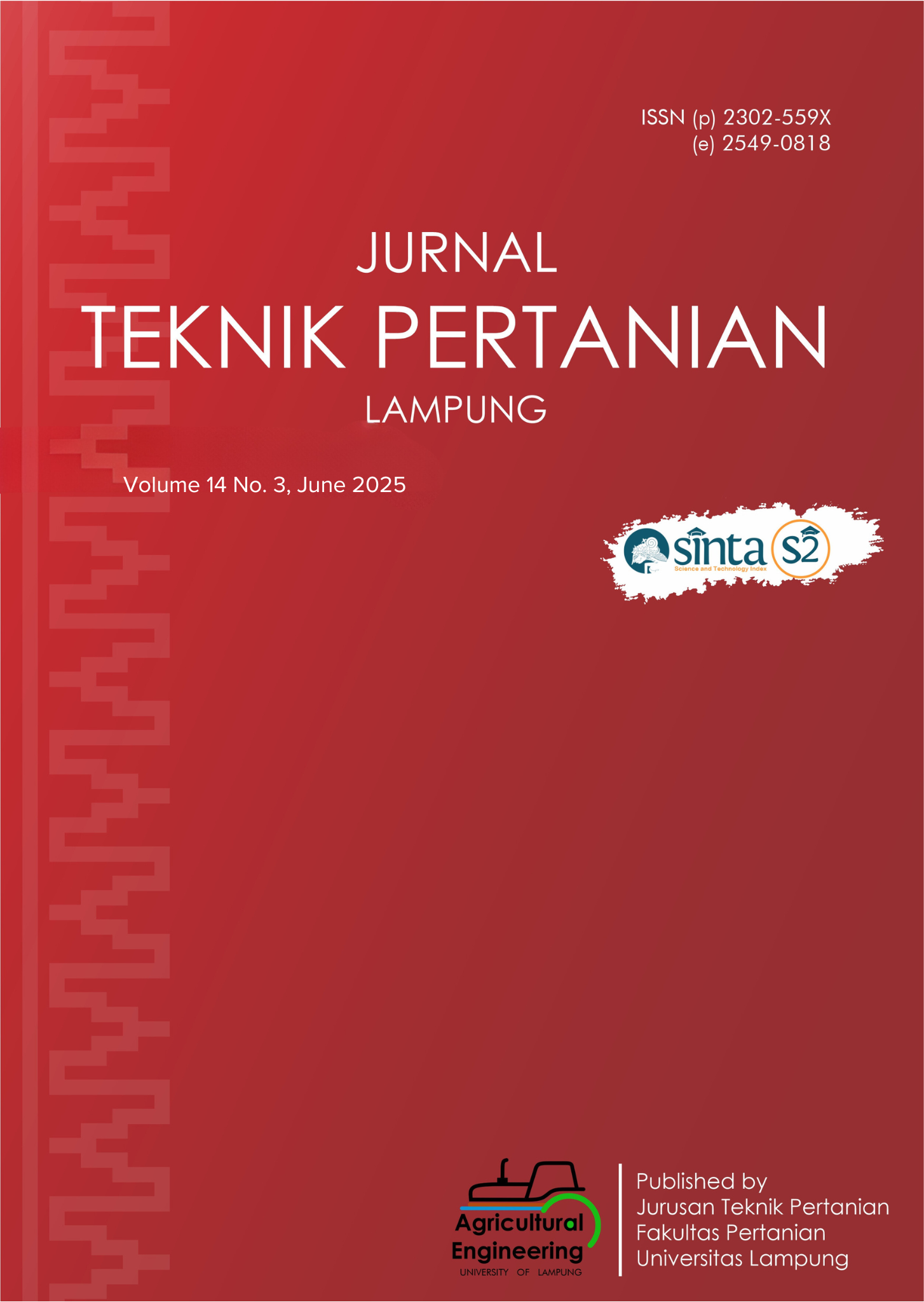Physicochemical and Functional Characteristics of Analog Rice Made from Local Cassava and Red Kidney Bean
DOI:
https://doi.org/10.23960/jtep-l.v14i3.846-857 Abstract View: 399
Abstract View: 399
Abstract
Nuabosi cassavas and Inerie red kidney beans are local foods from East Nusa Tenggara whose processing is relatively limited, but they have the potential to be developed into analog rice. This study aims to determine the effects of various compositions of Nuabosi cassava flour and Inerie red kidney bean flour on the characteristics of the produced analog rice. The procedure was conducted in three main stages: the preparation of cassava flour and red beans, formulation and production, and analysis. Various compositions of Nuabosi cassavas flour and Inerie red kidney beans were used: 98:0 (A); 88:10 (B); 83:15 (C); 78:20 (D); 73:25 (E). The data were analyzed by ANOVA, followed by DMRT at a 5% significance level. The results of the study showed, analog rice sample D (78% cassavas flour: 20% red kidney beans flour) has the best physicochemical and antioxidant activity characteristics of all samples. Furthermore, the sensory analysis results showed that most panelists had started to like the aroma, taste, and texture of analog rice made from 78% cassavas flour and 20% red kidney beans flour. Analog rice made from Nuabosi cassavas and Inerie red kidney beans has the potential to be developed as a functional food.
Keywords: Kriging interpolation; MSFI; paddy field; soil fertility index, soil mapping.
Downloads
References
Adefegha, S.A., Okeke, B.M., Oyeleye, S.I., & Oboh, G. (2021). Effects of processing on starch composition, glycemic indices, phenolic profile, and possible antidiabetic properties of cassava (Manihot esculenta) flours. Journal of Food Processing and Preservation, 45(7). https://doi.org/10.1111/jfpp.15586
Afriyani, U., Koestedjo, E.H., & Wanto, H.S. (2021). Analisis trend dan pengaruh pertumbuhan penduduk, produksi dan konsumsi terhadap indeks produksi dan konsumsi beras tahun 1990–2019 di Indonesia. Jurnal Analisis Kebijakan Dan Pelayanan Publik, 21(1).
Agustina, N., Waluyo, S., Warji, W., & Tamrin, T. (2013). Pengaruh suhu perendaman terhadap koefisien difusi dan sifat fisik kacang merah (Phaseolus vulgaris L.). Jurnal Teknik Pertanian Lampung, 2(1), 35–42.
Aller, E.E.J.G., Larsen, T.M., Claus, H., Lindroos, A.K., Kafatos, A., Pfeiffer, A., Martinez, J.A., Handjieva-Darlenska, T., Kunesova, M., Stender, S., Saris, W.H.M., Astrup, A., & Van Baak, M.A. (2014). Weight loss maintenance in overweight subjects on ad libitum diets with high or low protein content and glycemic index: The DIOGENES trial 12-month results. International Journal of Obesity, 38(12), 1511–1517. https://doi.org/10.1038/ijo.2014.52
Anggraeni, T. (2020). A comparative study of Indonesian estimated rice production and consumption. Jurnal Analisis Kebijakan dan Pelayanan Publik, 6(2), 101–112.
Ansari, A., Pranesti, A., Telaumbanua, M., Alam, T., Taryono, Wulandari, R.A., Nugroho, B.D.A., & Supriyanta. (2023). Evaluating the effect of climate change on rice production in Indonesia using multimodelling approach. Heliyon, 9(9). https://doi.org/10.1016/j.heliyon.2023.e19639
Arifin, H., Chou, K.R., Ibrahim, K., Fitri, S.U.R.A., Pradipta, R.O., Rias, Y.A., Sitorus, N., Wiratama, B.A., Setiawan, A., Setyowati, S., Kuswanto, H., Mediarti, D., Rosnani, R., Sulistini, R., & Pahria, T. (2022). Analysis of modifiable, non modifiable, and physiological risk factors of non-communicable diseases in Indonesia: evidence from the 2018 Indonesian basic health research. Journal of Multidisciplinary Healthcare, 2203-2221. https://doi.org/10.2147/JMDH.S382191
Association of Official Analytical Chemist [AOAC]. (2006). Official Methode of Analytical of Chemist. Astuti, S., S., S.A., & Anayuka, S.A. (2019). Sifat fisik dan sensori flakes pati garut dan kacang merah dengan penambahan tiwul singkong. Jurnal Penelitian Pertanian Terapan, 19(3), 232. https://doi.org/10.25181/jppt.v19i3.1440
BPS (Badan Pusat Statistik). (2022). Produksi Ubi Kayu Menurut Kabupaten/Kota (Ton), 2020-2022. Badan Pusat Statistik. Carbas, B., Machado, N., Oppolzer, D., Ferreira, L., Queiroz, M., Brites, C., Rosa, E.A.S., & Barros, A.I. (2020). Nutrients, antinutrients, phenolic composition, and antioxidant activity of common bean cultivars and their potential for food applications. Antioxidants, 9(2). https://doi.org/10.3390/antiox9020186
Chávez-Mendoza, C., & Sánchez, E. (2017). Bioactive compounds from Mexican varieties of the common bean (Phaseolus vulgaris): Implications for health. Molecules, 22(8). https://doi.org/10.3390/molecules22081360
Dalbhagat, C.G., Mahato, D.K., & Mishra, H.N. (2019). Effect of extrusion processing on physicochemical, functional and nutritional characteristics of rice and rice-based products: A review. Trends in Food Science and Technology, 85, 226–240. https://doi.org/10.1016/j.tifs.2019.01.001
Darmanto, Y.S., Kurniasih, R.A., Romadhon, R., Riyadi, P.H., & Anggraeni, N. (2022). Characteristic of analog rice made from arrowroot (Maranta arundinacease) and seaweed (Gracilaria verrucosa) flour fortified with fish collagen. Food Research, 6(5), 370–379. https://doi.org/10.26656/fr.2017.6(5).473
Elisabeth, D.A.A., Utomo, J.S., Byju, G., & Ginting, E. (2022). Cassava flour production by small scale processors, its quality and economic feasibility. Food Science and Technology (Brazil), 42. https://doi.org/10.1590/fst.41522
Faturochman, H.Y., Ismaya, P.L., Hasani, R.P., Alfatah, R.F., & Nur’alina, I. (2022). Karakteristik beras analog instan dari tepung sorgum (Sorghum bicolor L) pragelatinisasi dengan penambahan tepung daun kelor (Moringa oleifera). Jurnal Gizi Dan Pangan Soedirman, 6(2), 102. https://doi.org/10.20884/1.jgipas.2022.6.2.7102
Ferdian, Putri, L.V., & Kiyat, W.El. (2019). Perubahan kadar air dan mikrobiologi bubur instan selama penyimpanan dengan variasi kondisi pre-packing. Jurnal Konversi, 8(1), 17–32.
Förster, H., Sterzel, T., Pape, C.A., Moneo-Lain, M., Niemeyer, I., Boer, R., & Kropp, J.P. (2011). Sea-level rise in Indonesia: On adaptation in the agricultural sector. Regional Environmental Change, 11(4), 893–904. https://doi.org/10.1007/s10113-011-0226-9
Guo, Z., Huang, Z., Guo, Y., Li, B., Yu, W., Zhou, L., Jiang, L., Teng, F., & Wang, Z. (2021). Effects of high-pressure homogenization on structural and emulsifying properties of thermally soluble aggregated kidney bean (Phaseolus vulgaris L.) proteins. Food Hydrocolloids, 119. https://doi.org/10.1016/j.foodhyd.2021.106835
Handayani, N.H., Cahyono, H., Arum, W., Sumantri, I., Purwanto, & Soetrisnanto, D. (2017). Kajian karakteristik beras analog berbahan dasar tepung dan pati ubi ungu (Ipomea batatas). Jurnal Aplikasi Teknologi Pangan, 6(1). https://doi.org/10.17728/jatp.210
Hidayat, B., Akmal, S., Muslihudin, M., & Suhada, B. (2017). Assessment of corn-based rice analogues made from modified corn flour and cassava starch which processed by granulation method as functional food. Food Science and Quality Management, 61, 19-24.
Huicui, M., Matthan, N.R., Ausman, L. M., & Lichtenstein, A.H. (2017). Effect of macronutrients and fiber on postprandial glycemic responses and meal glycemic index and glycemic load value determinations. The American Journal of Clinical Nutrition, 105(4), 842–853. https://doi.org/10.3945/ajcn.116.144162
Jariyah, J., & Vestra, A. (2023). Characteristics of rice analog from composite flour (Mocaf: sago: soybean: moringa leaf) with addition of carrageenan. Jurnal Teknologi Hasil Pertanian, 16(2), 94. https://doi.org/10.20961/jthp.v16i2.61507
Kusumayanti, H., Sumardiono, S., & Jos, B. (2022). The combined effect of three raw materials composition on the production of analog Characteristics properties. Materials Today: Proceedings, 63, S418–S423. https://doi.org/10.1016/j.matpr.2022.04.087
Lal, M.K., Singh, B., Sharma, S., Singh, M.P., & Kumar, A. (2021). Glycemic index of starchy crops and factors affecting its digestibility: A review. Trends in Food Science and Technology, 111, 741–755. https://doi.org/10.1016/j.tifs.2021.02.067
Lewar, Y., Hasan, A., Salli, M.K., & Sangadji, H.M. (2020). Produksi benih kacang merah varietas Inerie di dataran rendah dalam kegiatan program pengembangan usaha produk intelektual kampus. Jurnal Ilmiah Madiya (Masyarakat Mandiri Berkarya), 1(2), 37–47. Retrieved from https://ojs.polmed.ac.id/index.php/Madiya/article/view/197
Lewar, Y., Hasan, M., & Lehar, L. (2018). Effect of biochar types and sprinkling water volume on seed production and seed protein and fat content of red bean under lowlands dry climates for textural. Bioscience Research, 15(3), 2848–2853.
Li, H., Prakash, S., Nicholson, T.M., Fitzgerald, M.A., & Gilbert, R.G. (2016). The importance of amylose and amylopectin fine structure properties of cooked rice grains. Food Chemistry, 196, 702–711. https://doi.org/10.1016/j.foodchem.2015.09.112
Liberty, I.A., Kurniawan, F., Wijaya, C.N., Soewondo, P., & Tahapary, D.L. (2024). the impact of lifestyle changes on the prevalence of prediabetes and diabetes in urban and rural Indonesia: results from the 2013 and 2018 Indonesian basic health research (riskesdas) survey. Diabetology, 5(6), 537-553. https://doi.org/10.3390/diabetology5060039
Los, A., Ziuzina, D., & Bourke, P. (2018). Current and future technologies for microbiological decontamination of cereal grains. Journal of Food Science, 83(6), 1484–1493. https://doi.org/10.1111/1750-3841.14181
Meullenet, J.-F., Marks, B.P., Hankins, J.-A., Griffin, V.K., & Daniels, M.J. (2000). Sensory quality of cooked long-grain rice as affected by rough rice moisture content, storage temperature, and storage duration. Journal of Food Science, 77(2). https://doi.org/10.1094/CCHEM.2000.77.2.259
Mohajan, S., Orchy, T.N., & Farzana, T. (2018). Effect of incorporation of soy flour on functional, nutritional, and sensory properties of mushroom–moringa-supplemented healthy soup. Food Science and Nutrition, 6(3), 549–556. https://doi.org/10.1002/fsn3.594
Muralidharan, J., Galiè, S., Hernández-Alonso, P., Bulló, M., & Salas-Salvadó, J. (2019). Plant-based fat, dietary patterns rich in vegetable fat and gut microbiota modulation. Frontiers in Nutrition, 6. https://doi.org/10.3389/fnut.2019.00157
Mutiara, C., & Bolly, Y.Y. (2019). Identification of agricultural activities and soil fertility in the cultivation area of Nuabosi cassava. Caraka Tani: Journal of Sustainable Agriculture, 34(1), 22–30. https://doi.org/10.20961/carakatani.v34i1.25708
Ngongo, Y., Basuki, T., Derosari, B., Mau, Y.S., Noerwijati, K., Dasilva, H., Sitorus, A., Kotta, N.R.E., Utomo, W.H., & Wisnubroto, E.I. (2022). The roles of cassava in marginal semi-arid farming in East Nusa Tenggara—Indonesia. Sustainability (Switzerland), 14(9). https://doi.org/10.3390/su14095439
Noviasari, S., Widara, S.S., & Budijanto, S. (2017). Analogue rice as the vehicle of public nutrition diversity. Jurnal Kesehatan Masyarakat, 13(1), 18–27. https://doi.org/10.15294/kemas.v13i1.8284
Nugraheni, M., Purwanti, S., & Ekawatiningsih, P. (2020). Nutrient and sensory analysis of analog rice made with arrowroot (Maranta arundinaceae) flour, germinated red kidney bean (Phaseolus vulgaris L.) flour, germinated white sorghum flour, and sago starch. Food Research, 4(6), 2241–2246. https://doi.org/10.26656/fr.2017.4(6).269
Poonsri, T., Jafarzadeh, S., Ariffin, F., Abidin, S.Z., Barati, Z., Latif, S., & Müller, J. (2019). Improving nutrition, physicochemical and antioxidant properties of rice noodles with fiber and protein-rich fractions derived from cassava leaves. Journal of Food and Nutrition Research, 7(4), 325–332. https://doi.org/10.12691/jfnr-7-4-10
Priska, M., Peni, N., Carvallo, L., & Wae, V.P.S.M. (2020). Effect of drying techniques on nutrition content and gross energy of Nuabosi cassava (Manihot esculenta) flour. Biosaintifika, 12(2), 220–225. https://doi.org/10.15294/biosaintifika.v12i2.24184
Probosari, E. (2019). Pengaruh protein diet terhadap indeks glikemik. JNH (Journal of Nutrition and Health), 7(1), 33-39.
Pu’u, Y.M.S.W. (2019). Relationship between population and intensity of cassava mealybug (Phenacoccus manihoti) attack on Flores Caraka Tani: Journal of Sustainable Agriculture, 34(1), 61–66. https://doi.org/10.20961/carakatani.v34i1.25974
Punia, S., Dhull, S.B., Sandhu, K.S., Kaur, M., & Purewal, S.S. (2020). Kidney bean (Phaseolus vulgaris) starch: A review. Legume Science, 2(3), 1–7. https://doi.org/10.1002/leg3.52
Putri, A.W.H., Sukendar, N.K., & Hasizah, A. (2023). The effect of water content and cooling temperature on the increase of type III resistant starches (RS III) in lesser yam (Dioscorea esculenta L.) flour. AIP Conference Proceedings, 2596, 040001. https://doi.org/10.1063/5.0119530
Putri, E.C.J., & Sumardiono, S. (2020). Analog rice production of composite materials flour (cassava, avocado seeds, and tofu waste) for functional food. AIP Conference Proceedings, 2197, 070005. https://doi.org/10.1063/1.5140938
Ramadhan, W., Purwaningsih, S., & Nafisah, S. (2024). Effects of microwave cooking on the physicochemical and sensory properties of seaweed-based analogue rice. International Journal of Food Science and Technology, 59(3), 1770–1780. https://doi.org/10.1111/ijfs.16930
Ramírez-Jiménez, A.K., Gaytán-Martínez, M., Morales-Sánchez, E., & Loarca-Piña, G. (2018). Functional properties and sensory value of snack bars added with common bean flour as a source of bioactive compounds. LWT, 89, 674–680. https://doi.org/10.1016/j.lwt.2017.11.043
Ratnawati, L., Desnilasari, D., Surahman, D.N., & Kumalasari, R. (2019). Evaluation of physicochemical, functional and pasting properties of soybean, mung bean and red kidney bean flour as ingredient in biscuit. IOP Conference Series: Earth and Environmental Science, 251(1). https://doi.org/10.1088/1755-1315/251/1/012026
Singh, B.N., Singh, B.R., Singh, R.L., Prakash, D., Singh, D.P., Sarma, B.K., Upadhyay, G., & Singh, H.B. (2009). Polyphenolics from various extracts/fractions of red onion (Allium cepa) peel with potent antioxidant and antimutagenic activities. Food and Chemical Toxicology, 47(6), 1161–1167. https://doi.org/10.1016/j.fct.2009.02.004
Soekarto, S.T., & Adawiyah, D.R. (2012). Keterkaitan berbagai konsep interaksi air dalam produk pangan. Ulasan Ilmiah J. Teknol. dan Industri Pangan, 23(1), 107–116.
Sofiah, S., Aswan, A., Yunanto, I., Ramayanti, C., Amelia, P.D., & Utami, A.N. (2022). Making herbal tea from a mixture of butterfly pea flower (Clitoria ternatea) and ginger powder (Zingiber officinale) by using drying method according to Indonesian National Standards (SNI). In Proceedings of the 5th FIRST T1 T2 2021 International Conference (FIRST-T1-T2 2021). https://doi.org/10.2991/ahe.k.220205.019
Wahjuningsih, S.B., & Susanti, S. (2018). Chemical, physical, and sensory characteristics of analog rice developed from the mocaf, arrowroot, and red bean flour. IOP Conference Series: Earth and Environmental Science, 102(1). https://doi.org/10.1088/1755-1315/102/1/012015
Wang, L., Chessari, C., & Karpiel, E. (2001). Inferential control of product quality attributes—application to food cooking extrusion process. Journal of Process Control, 11, 621–636. https://doi.org/10.1016/S0959-1524(00)00055-X
Widiawati, D., Giovani, S., & Liana, S. P. (2022). Formulasi dan karakterisasi mi kering substitusi tepung kacang merah tinggi serat. Jurnal Al-Azhar Indonesia Seri Sains dan Teknologi, 7(2), 80. https://doi.org/10.36722/sst.v7i2.1114
Yuwono, S.S., Febrianto, K., & Dewi, N.S. (2015). Pembuatan beras tiruan berbasis modified cassava flour (MOCAF): Kajian proporsi MOCAF: Tepung beras dan penambahan tepung porang. Jurnal Teknologi Pertanian, 14(3), 176–178.
Zambrano, M.V., Dutta, B., Mercer, D.G., MacLean, H.L., & Touchie, M.F. (2019). Assessment of moisture content measurement methods of dried food products in small-scale operations in developing countries: A review. Trends in Food Science & Technology, 88, 484–496. https://doi.org/10.1016/j.tifs.2019.04.006
Zhang, K., Dong, R., Hu, X., Ren, C., & Li, Y. (2021). Oat-based foods: Chemical constituents, glycemic index, and the effect of processing. Foods, 10(6). https://doi.org/10.3390/foods10061304
Downloads
Published
How to Cite
Issue
Section
License
Authors who publish with this journal agree to the following terms:
Authors retain copyright and grant the journal right of first publication with the work simultaneously licensed under a Creative Commons Attribution-ShareAlike 4.0 International Lice that allows others to share the work with an acknowledgement of the work's authorship and initial publication in this journal.
Authors are able to enter into separate, additional contractual arrangements for the non-exclusive distribution of the journal's published version of the work (e.g., post it to an institutional repository or publish it in a book), with an acknowledgement of its initial publication in this journal.
Authors are permitted and encouraged to post their work online (e.g., in institutional repositories or on their website) prior to and during the submission process, as it can lead to productive exchanges, as well as earlier and greater citation of published work (See The Effect of Open Access).
Jurnal Teknik Pertanian Lampung

JTEPL is licensed under a Creative Commons Attribution-ShareAlike 4.0 International License.













